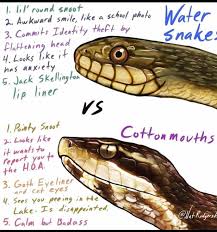venomous snakes of fl
1/12
There's no tags or description
Looks like no tags are added yet.
Name | Mastery | Learn | Test | Matching | Spaced |
|---|
No study sessions yet.
13 Terms
how many sp of venomous snakes in fl?
6 (7)
what are the 6 venomous snake sp in fl
-copperhead (only rlly in panhandle)
-cottonmouth
-coral snake
-diamond backed rattlesnake
-pygmy rattlesnake
-timber rattlesnake
characteristics of venomous pit vipers (all together)
-thick, blocky head w obvious neck
-heavy bodied for their length
-relatively short, thick tail
-heat sensitive pit on side of face
-complete scales on underside of tail
-keeled scales (in some non-venomous too) (why watersnakes are confused a lot)
-often a dark band from eye to corner of jaw
-elliptical pupil
pit viper vs. elapid (coral snake) dentition
pit viper: solenoglyph dentition (fangs hollow and erectile, sit on rotating maxilla bone)
elapid: proteroglyph dentition (fangs hollow and permanently erect sit on fixed maxilla bone)
difference between pit viper and elapid venom
pit viper: predominately hemotoxic (affecting tissues)
elapid: predominately neurotoxic
cottonmouth/water moccasin (pit viper)
-pit viper characteristics
-variable colors
-more terrestrial than one might think
-not super aggressive
-most common bites in this area - really just because they are common snakes
-occur in entire state
how can you tell the difference between watersnakes and water moccasins?
water snakes have prominent labial bars

copperhead - pit viper
-only occur in panhandle
-dont get quite as big
-hourglass markings on distinctive colored peach body
-juveniles have sulfur yellow tail (cottonmouths too) - can use as a lure for prey
-very good at camo
eastern diamond backed rattlesnake - pit viper
-really distinctive diamond pattern (though there can be individual variation)
-found in entire state of fl
-more of an uplands snake
-at some pt may get federally listed as threatened
timber rattlesnake - pit viper
-seen in north florida
-chevron type print and rusty colored line running down back
pygmy rattlesnake - pit viper
-very distinctive, gray body with brown/black spots and an orange line running down back
-heavy bodied for length even though they don’t get that big
-seen throughout entire state
-can be individual variation
eastern (harlequin) coral snake - elapid
-entire state
-looks like scarlet kingsnake or scarletsnake
-but if yellow band touches red band - STOP
-black tip to snout
-there is individual variation
why should you not handle a dead venomous snake?
can still get bit